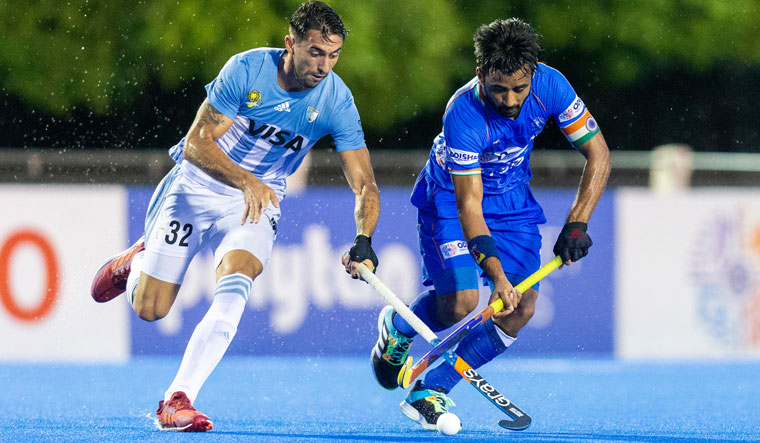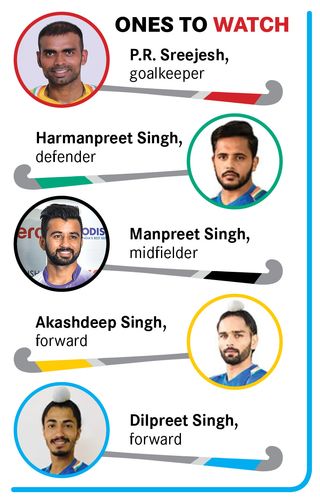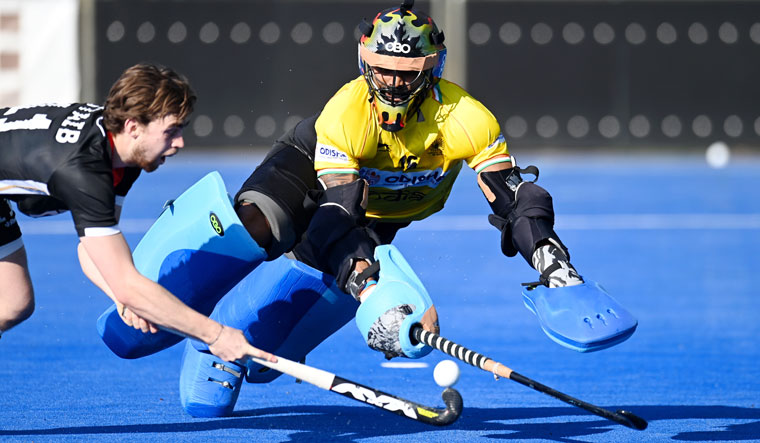As the clock ticks down to the Tokyo Olympics, athletes worldwide are hoping that it is not another false start. Especially the Indian men’s hockey team. For the past 15 months, the 33-member squad has been following an intense schedule charted out by chief coach Graham Reid when the pandemic first struck. They are based at the Sports Authority of India centre in Bengaluru. Breaks from the campus have been few and far between; the latest were tours of Germany, Belgium and Argentina in March and April this year. A ten-day quarantine upon return, and it was back to training.
There was talk of another much-needed foreign tournament in May, but Covid-19 dashed those hopes. As part of the FIH Hockey Pro League, India was scheduled to take on England in London on May 8 and 9, Spain in Valencia on May 15 and 16, and Germany in Hamburg on May 22 and 23. The host countries, however, banned all flights to and from India.
The players, though, are laser-focused on Tokyo. While bio-bubbles worldwide have led to burnout among athletes, India’s hockey team has brushed aside any such talk. Said captain and star midfielder Manpreet Singh: “[It has been] a difficult time, but we have utilised it well. When the FIH Pro League matches were postponed, we were extremely disappointed. But we understand these are really unprecedented times, and there are travel restrictions in place.”
Veteran goalkeeper P.R. Sreejesh, who is preparing for his third Olympics, told THE WEEK: “We were in a lockdown last year at the SAI campus. We had the 90-acre hostel to ourselves; we had our own gym. It was tough for the players to hear that there was one more year to go for the Olympics. The team was performing well and was in good shape. Gradually, everyone accepted it. The best part was that we were able to train together.”
Up-and-coming forward Gurjant Singh said the time spent together at the national camp had bettered communication between players, the results of which were visible in Europe and Argentina. “I do not think any other team would have spent this much time together during the lockdown,” he said. “After the nationwide lockdown ended, we never stopped training. I think it has built a natural understanding among us and, because of that, the team has been working as a unit.”
Reid, meanwhile, has found himself working, not for the first time, on plans C, D and E, hoping that the team would be allowed into Europe in June.
As coach, he has to ensure the well-being of each player, but he himself has not gone back home to Australia in over a year.
The 57-year-old former Olympian and former head coach of Australia called the past year-and-a-half surreal. “Most kids dream of going to the Olympics,” he told THE WEEK. “We are carrying their hopes and dreams. Usually, guys get to go home after four weeks, [but] these have been four- to five-month camps. We have tried to keep the guys focused on what we can control.”
To make matters worse, six players—Manpreet Singh, Mandeep Singh, Jaskaran Singh, Surender Kumar, Varun Kumar and Krishan B. Pathak—tested positive for Covid-19 last August.
Reid and the support staff have been trying to keep the players mentally upbeat. They have each been made to record videos, talking about their families, their past and their dreams. “We shared [all this] with each other…,” said Reid. “What is also interesting is that we created scenarios, like what happens if we get redirected from airport, how do we react? What happens if we get into the Olympics village and find all of us in one room? It has helped make us stronger.”
Having taken up the coaching job in 2019, Reid had his wife, Julia, for company till about two months ago. “She was with me till the German trip,” he said. “It is difficult without kids. We have two of them, Scott and Emma, whom we have not seen for 16 months now.”
Currently, Reid and his players are analysing the recent victories against Argentina. Ranked 4th in the FIH world rankings, India beat the Olympic champions 2-2 (3-2 penalty shootout) and 3-0 in the FIH Hockey Pro League matches, and 4-3, 4-2 in practice matches. India lost one practice match 0-1 and drew another one 4-4.
Former Olympian Jagbir Singh said the wins were no fluke. “I think we are the best-prepared team for the Olympics,” he told THE WEEK. “This lot has been training continuously. It is a squad with a mix of experience and youth. These boys have come through the structure. Players like Dilpreet, Hardik, Harmanpreet and even Manpreet have grown with the seniors. I am sure they will not come back without a medal.”
The lack of enough top-level matches did not bother Jagbir. “[It] does not matter,” he said. “You can play 10 matches more than the other countries, yet you have to deliver at the Games. These boys have got proper training, and they are not just mentally prepared, [but] they are also hungry.”
Sreejesh agreed. “In the past 15 months, we have understood where we are,” he said. “Every player understands his skill level and what he is good at. [It is] good that we will not play other teams; no one would know what we are going to do. It will be a surprise for them.”
Captain Manpreet said that the seniors like him, Sreejesh, Chinglensana Singh, Surender and Harmanpreet Singh had made the youngsters in the team feel secure and confident. “If a junior makes a mistake, we try to ensure that it does not stay in his mind. For example, [in a recent match], Vivek mis-passed and Argentina scored. At half time, we told him it happens, and we will win and lose as a team. He started playing better after that.”
Sreejesh said India’s consistent performances since 2019 had ensured that top teams did not take it for granted anymore. “The confidence level of the team is visible to everyone,” he said. “The youngsters have gradually improved. Early last year we did well against Australia, Holland and Belgium, which gave confidence to all the players. We are now following a proper structure; while we had foreign coaches five years back, we were still playing individual styles. Now the youngsters are coming into a well-constructed team and are gelling with others.”
As for his own swan song—his planned retirement has been put off for a year—Sreejesh said: “In the past two years, I have set smaller targets—the World Cup, the Pro League, the Olympics. My family supported my wish to carry on till the Olympics. If you start comparing yourself with youngsters, you make things difficult for yourself. But if you are comparing yourself to what you were five years back, you see an experienced, improved goalkeeper. The best goalkeepers in the world are in their 30s.”
“A goalkeeper does not quit early,” said Jagbir, pointing out that Argentinian Juan Manuel Vivaldi, 41, was eyeing a second Olympic medal at Tokyo.
He added that a strong pool of players and the extra time for the Olympics had given Reid enough options for the makeup of his squad. “He has rotated the players for various matches since he came in, and has taken the team and players forward. He knows their skills, strengths and weaknesses well. This is a fearless set of players. They will play bindaas (daring) hockey.”




